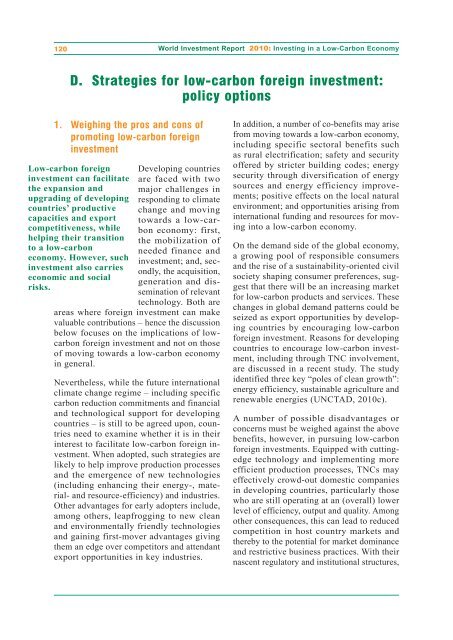UN World Investment Report 2010 - Office of Trade Negotiations
UN World Investment Report 2010 - Office of Trade Negotiations
UN World Investment Report 2010 - Office of Trade Negotiations
Create successful ePaper yourself
Turn your PDF publications into a flip-book with our unique Google optimized e-Paper software.
120<br />
1. Weighing the pros and cons <strong>of</strong><br />
promoting low-carbon foreign<br />
investment<br />
Low-carbon foreign Developing countries<br />
investment can facilitate are faced with two<br />
the expansion and major challenges in<br />
upgrading <strong>of</strong> developing responding to climate<br />
countries’ productive change and moving<br />
capacities and export towards a low-car-<br />
competitiveness, while bon economy: first,<br />
helping their transition the mobilization <strong>of</strong><br />
to a low-carbon needed finance and<br />
economy. However, such<br />
investment; and, sec-<br />
investment also carries<br />
ondly, the acquisition,<br />
economic and social<br />
generation and dis-<br />
risks.<br />
semination <strong>of</strong> relevant<br />
technology. Both are<br />
areas where foreign investment can make<br />
valuable contributions – hence the discussion<br />
below focuses on the implications <strong>of</strong> lowcarbon<br />
foreign investment and not on those<br />
<strong>of</strong> moving towards a low-carbon economy<br />
in general.<br />
Nevertheless, while the future international<br />
climate change regime – including specific<br />
carbon reduction commitments and financial<br />
and technological support for developing<br />
countries – is still to be agreed upon, countries<br />
need to examine whether it is in their<br />
interest to facilitate low-carbon foreign investment.<br />
When adopted, such strategies are<br />
likely to help improve production processes<br />
and the emergence <strong>of</strong> new technologies<br />
(including enhancing their energy-, material-<br />
and resource-efficiency) and industries.<br />
Other advantages for early adopters include,<br />
among others, leapfrogging to new clean<br />
and environmentally friendly technologies<br />
and gaining first-mover advantages giving<br />
them an edge over competitors and attendant<br />
export opportunities in key industries.<br />
<strong>World</strong> <strong>Investment</strong> <strong>Report</strong> <strong>2010</strong>: Investing in a Low-Carbon Economy<br />
D. Strategies for low-carbon foreign investment:<br />
policy options<br />
In addition, a number <strong>of</strong> co-benefits may arise<br />
from moving towards a low-carbon economy,<br />
including specific sectoral benefits such<br />
as rural electrification; safety and security<br />
<strong>of</strong>fered by stricter building codes; energy<br />
security through diversification <strong>of</strong> energy<br />
sources and energy efficiency improvements;<br />
positive effects on the local natural<br />
environment; and opportunities arising from<br />
international funding and resources for moving<br />
into a low-carbon economy.<br />
On the demand side <strong>of</strong> the global economy,<br />
a growing pool <strong>of</strong> responsible consumers<br />
and the rise <strong>of</strong> a sustainability-oriented civil<br />
society shaping consumer preferences, suggest<br />
that there will be an increasing market<br />
for low-carbon products and services. These<br />
changes in global demand patterns could be<br />
seized as export opportunities by developing<br />
countries by encouraging low-carbon<br />
foreign investment. Reasons for developing<br />
countries to encourage low-carbon investment,<br />
including through TNC involvement,<br />
are discussed in a recent study. The study<br />
identified three key “poles <strong>of</strong> clean growth”:<br />
energy efficiency, sustainable agriculture and<br />
renewable energies (<strong>UN</strong>CTAD, <strong>2010</strong>c).<br />
A number <strong>of</strong> possible disadvantages or<br />
concerns must be weighed against the above<br />
benefits, however, in pursuing low-carbon<br />
foreign investments. Equipped with cuttingedge<br />
technology and implementing more<br />
efficient production processes, TNCs may<br />
effectively crowd-out domestic companies<br />
in developing countries, particularly those<br />
who are still operating at an (overall) lower<br />
level <strong>of</strong> efficiency, output and quality. Among<br />
other consequences, this can lead to reduced<br />
competition in host country markets and<br />
thereby to the potential for market dominance<br />
and restrictive business practices. With their<br />
nascent regulatory and institutional structures,

















